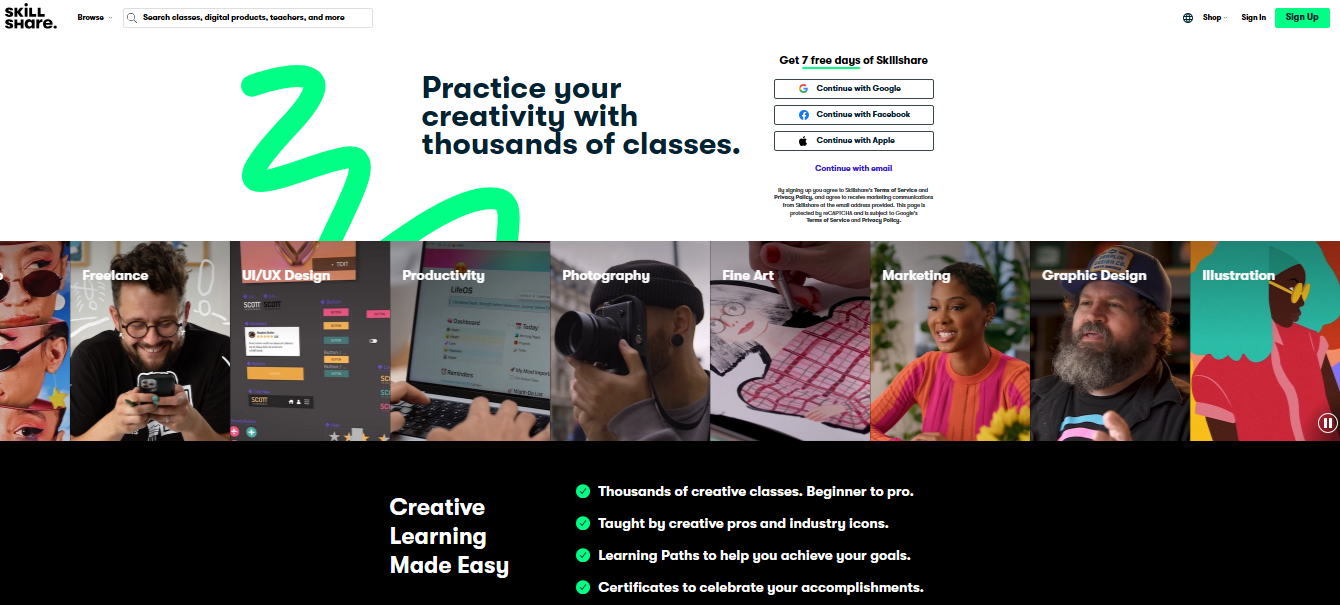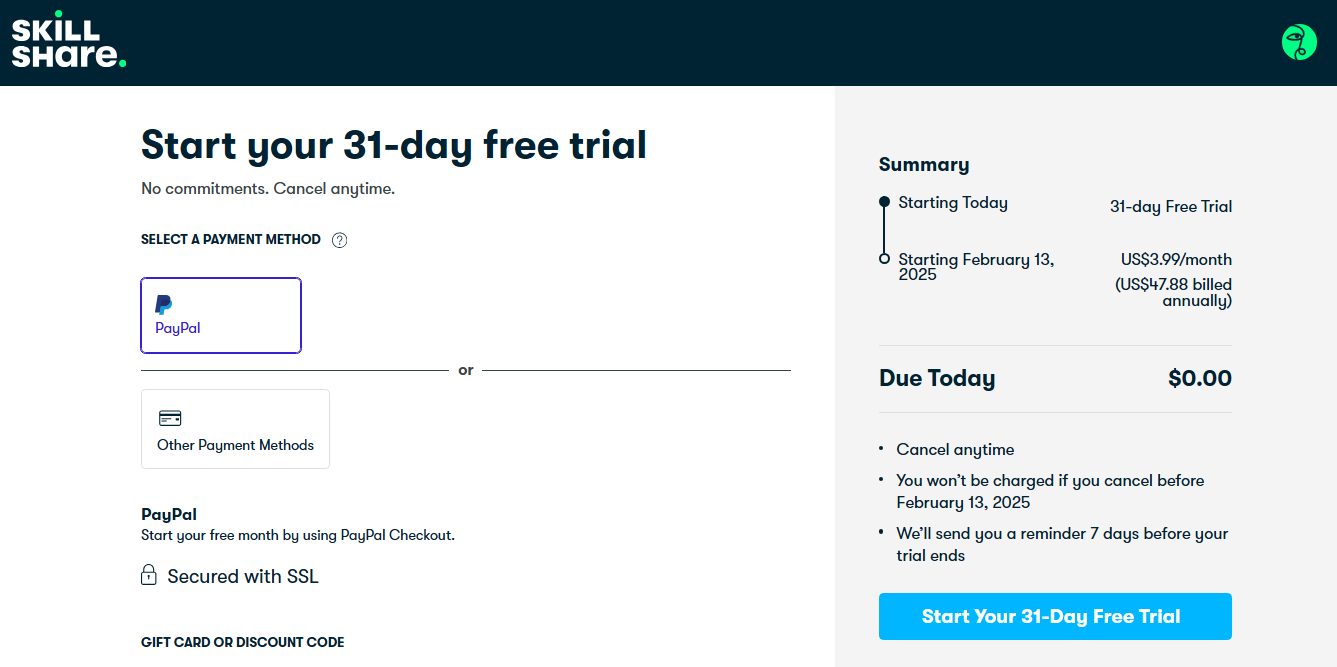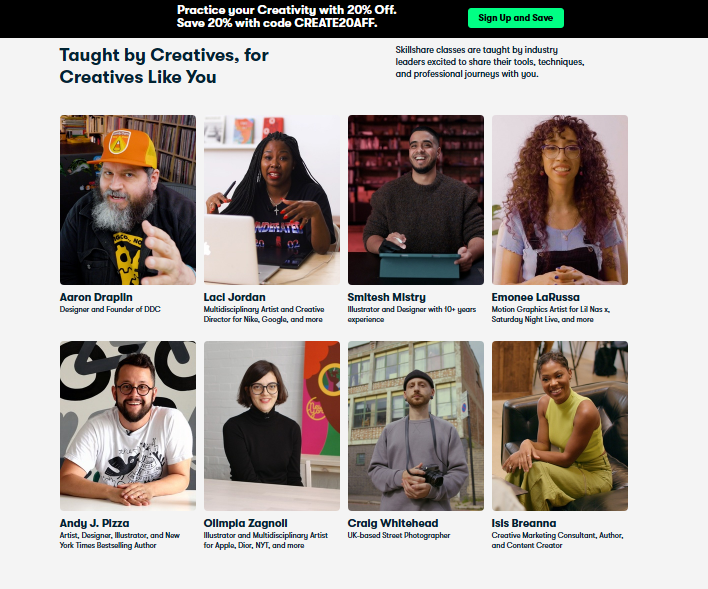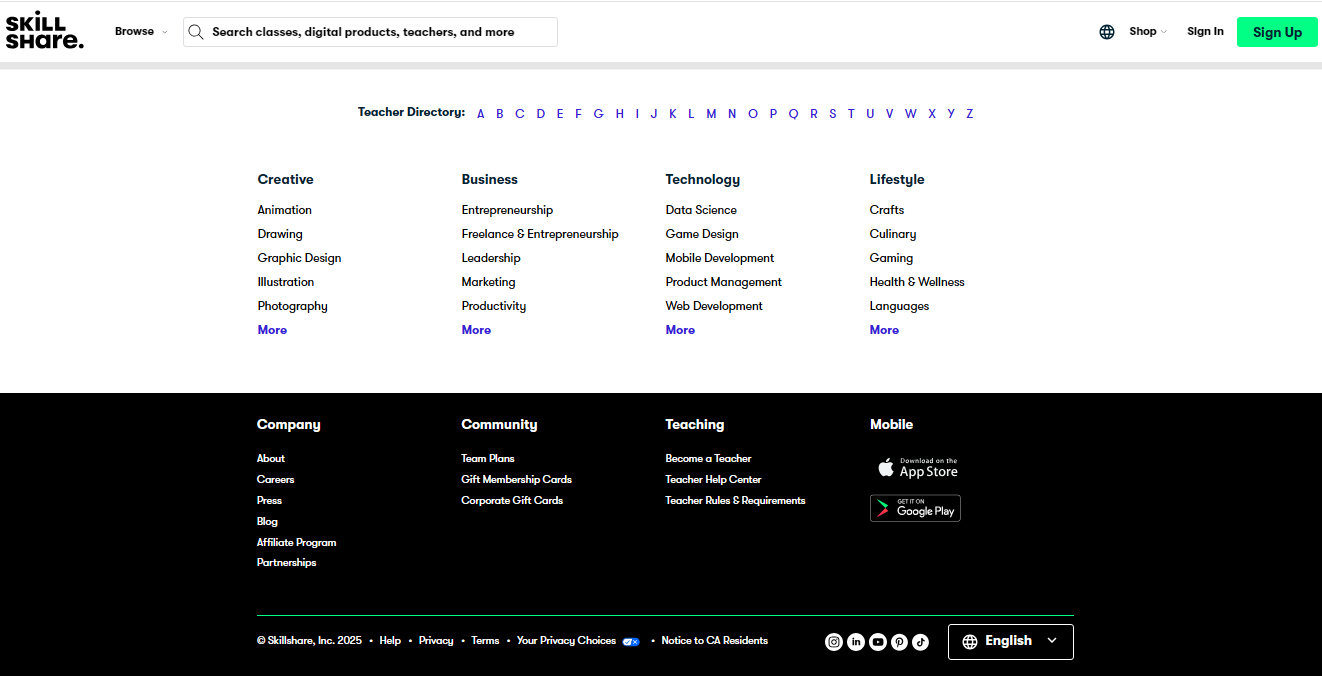GregoryBergman
Member
The digital education world is changing fast. Online learning platforms are key for growth and learning. Coursera and Skillshare lead this change, offering learning experiences to millions globally.
These leaders have changed how we learn. Coursera links learners to top university courses, like Yale. Skillshare focuses on creative skills through hands-on learning.
We'll look at what makes these platforms special. We'll examine their courses, prices, and learning styles. This will help learners choose the right path for their digital education.
Online learning is set to hit $62 billion by 2027. It's expected to reach 1 billion users by 2028. Knowing about Coursera and Skillshare is crucial. We'll find out what makes them stand out in the digital education market.
These platforms offer more than education. They open doors to personal and professional growth in our digital world.
Personalized learning is key in today's education. *Adaptive learning technologies* let students follow paths that fit their learning style and speed. Machine learning helps make these paths by analyzing how well students do, making learning more effective.
Micro-credentials offer a new way to learn skills. They are short, focused courses that match what you need for work. Big names like Coursera and Skillshare are leading this change, giving out valuable certificates.
Mobile learning has opened education to more people. In the US, 63% of students learn online every day. This has made learning possible from anywhere, breaking down old barriers.
The focus on skills shows how jobs are changing. Skills can go out of date quickly, so online learning helps keep up. With things like videos, quizzes, and live classes, learning stays fun and useful.

Coursera is known for its strong platform. It has over 142 million learners and works with 325 top universities. It offers professional-grade courses in tech, business, and personal growth. You can learn on any device, anytime, anywhere.
Skillshare focuses on creative and project-based learning. It has 35,000 classes for premium members. It's great for learning hands-on skills in illustration, writing, and photography. The content is practical and easy to digest, perfect for creatives and hobbyists.
User ratings show Coursera is more popular. It has a G2 rating of 4.5/5, while Skillshare is at 3.3/5. This shows more people are happy with Coursera. Easy access and simple navigation are big reasons for this.
Coursera stands out with its financial aid and flexible prices. You can buy courses or get Coursera Plus for everything. Skillshare is simpler with monthly or yearly memberships. You get unlimited access to its creative courses.
Interactive learning is key with tools that make learning fun. Coursera uses peer-reviewed assignments, lively discussion forums, and hands-on labs. These features turn watching into an engaging experience.
Learner analytics help students see how they're doing and where they need to improve. They can track their progress, find out what they don't know, and get tips for better learning. With over 1,000 applied projects, learners get real-world skills.
Skillshare adds to this by focusing on creative skills. It has about 35,000 courses in writing, design, and photography. Its short courses (1-3 hours) are perfect for busy people who want to learn something new fast.
By 2025, these platforms will give even more detailed insights into learning. Users will get detailed performance reports, track their skill growth, and follow learning paths that fit their style and goals.

Coursera's pricing strategy offers many entry points. Their Coursera Plus subscription costs $59 a month for unlimited courses. Individual courses start at $49, and professional certificates are priced well. Free online courses let learners try before they buy.
Skillshare has a different model. Their annual membership is about $168, or $14 a month. This gives access to over 40,000 courses. It's all-inclusive, with no extra fees for each course.
Both platforms value flexible learning. Skillshare offers a 30-day free trial. Coursera has many free courses. These options let learners check out courses and platforms without spending a lot.
Students on a budget will find many options. From free courses to full subscriptions, these platforms meet different needs and budgets. The goal is to find the best price for your learning goals.

Coursera is known for its strong partnerships with over 200 institutions. It offers more than 4,000 courses. The platform chooses expert instructors from top universities. Industry-relevant skills are key in their courses, helping learners apply what they learn in real jobs.
Skillshare focuses on creative and practical skills. It has over 20,000 courses. The platform is taught by industry pros. It's great for learning design, marketing, and entrepreneurship.
Both platforms have feedback systems. Students can rate and review courses. This keeps standards high and helps others choose the right courses. Whether you want to learn deeply or develop creative skills, these platforms have what you need.

Coursera works with over 200 universities to offer top-notch learning. It provides professional certificates that help students grow in their careers. Courses from places like Stanford and Duke give learners access to quality education.
Student engagement is high thanks to interactive courses. Skillshare focuses on project-based learning. This way, students learn by doing, linking theory to practice.
Online learning communities keep students motivated. Both platforms have forums and peer feedback. These features help students work together and stay motivated.
These platforms offer great career chances. Coursera's certificates are known by employers, while Skillshare's projects help build portfolios. Students can pick the best platform for their career goals.
By focusing on practical skills and relevant training, these platforms make online education powerful. It helps with personal and professional growth.
Coursera is known for its tough academic courses, working with over 200 universities worldwide. It draws in professionals and students aiming for higher education. With 118 million learners, Coursera offers deep learning in many fields.
Skillshare, on the other hand, focuses on creative skills and hands-on learning. It has over 30,000 classes for artists, designers, and creatives. Its community-based approach is great for those wanting to improve their art or try new creative methods.
Both platforms meet the need for flexible, easy-to-access education. Coursera offers structured courses for career and education, while Skillshare focuses on practical, creative learning. This lets learners pick the best platform for their personal and career goals.
Whether you're changing careers, a hobbyist, or always learning, these platforms offer customized learning. They fit different learning styles and goals.

At the heart of social learning, both platforms offer spaces for real student interactions. Skillshare's community focuses on project-based learning. Students can share their work, get feedback, and interact with course content. With over 30,000 courses, learners get many chances for online mentorship and skill growth.
Coursera has a different way to engage with the community. It uses peer-graded assignments and discussion forums. These features help students support and critique each other's learning. This makes online education more interactive and connected.
Important community features include discussion boards, group projects, and virtual study groups. Students can meet peers worldwide, share ideas, and build professional networks. The social learning model is more than just watching content. It lets learners actively take part in learning and improving skills.
Both platforms see learning as a social activity. They offer strong community tools. This makes online education lively, engaging, and connected to real-world teamwork.
Coursera's partnerships with top universities give it a big edge. Their professional certificates cost between $49 and $169. This makes it easy to get recognized credentials. These certificates are more than just digital badges. They show real skill development, backed by respected schools.
Skillshare focuses on skill learning over traditional certification. It offers over 25,000 courses but emphasizes practical skills. This is great for creative people and entrepreneurs who need skills they can use right away.
When choosing a platform, think about what you want to achieve. Coursera's certificates work well with LinkedIn, helping you advance in your career. Their courses are tough and match industry needs, making their certificates very appealing to employers.
In the end, the best platform depends on your career goals. Whether you want formal credentials or practical skills, online learning offers great opportunities for growth.
Course completion rates are impressive. Studies say online learning helps students keep 25% to 60% more info than classroom learning. Also, 95% of online students say they'd suggest online education to others. This shows how valuable these platforms are.
User stats are exciting for digital education's future. By 2027, online learning platforms will have 57 million users worldwide. It's not just about numbers; it's about how well users engage and learn. Coursera has a G2 rating of 4.5/5, showing its strong position. Skillshare keeps improving to meet learner needs.
70% of students like online classes better than traditional ones. This shows a big change in how we learn and grow professionally.
The future looks bright for online learning platforms. With better courses, instructors, and user experiences, Coursera and Skillshare are ready for more demand. They offer flexible, accessible education.
Each platform has its own strengths. Coursera gives a structured learning path with academic value. It costs between $29 and $99 per course, or $399 a year for Coursera Plus. Skillshare, priced at $15 a month or $99 a year, teaches practical creative skills and values community learning.
The online learning market is growing fast, expected to hit $62 billion by 2027. Both platforms keep improving. You can pick Coursera for a broad academic education or Skillshare for creative skills. The choice depends on your learning goals and style.
The future of online learning is about flexibility, quality content, and meaningful experiences. Whether you want to grow professionally or creatively, the right platform can help. It opens doors to new opportunities for personal and professional growth.
.
.
.
.
.
END
These leaders have changed how we learn. Coursera links learners to top university courses, like Yale. Skillshare focuses on creative skills through hands-on learning.
We'll look at what makes these platforms special. We'll examine their courses, prices, and learning styles. This will help learners choose the right path for their digital education.
Online learning is set to hit $62 billion by 2027. It's expected to reach 1 billion users by 2028. Knowing about Coursera and Skillshare is crucial. We'll find out what makes them stand out in the digital education market.
These platforms offer more than education. They open doors to personal and professional growth in our digital world.
Understanding Online Learning Platform Evolution in 2025
The digital education world is changing fast in 2025. E-learning trends are changing how we learn and grow. The online learning market is growing fast, expected to hit $350 billion by 2025.Personalized learning is key in today's education. *Adaptive learning technologies* let students follow paths that fit their learning style and speed. Machine learning helps make these paths by analyzing how well students do, making learning more effective.
Micro-credentials offer a new way to learn skills. They are short, focused courses that match what you need for work. Big names like Coursera and Skillshare are leading this change, giving out valuable certificates.
Mobile learning has opened education to more people. In the US, 63% of students learn online every day. This has made learning possible from anywhere, breaking down old barriers.
The focus on skills shows how jobs are changing. Skills can go out of date quickly, so online learning helps keep up. With things like videos, quizzes, and live classes, learning stays fun and useful.

Coursera vs Skillshare: Platform Comparison
Online learning is changing fast, and comparing platforms is key for students. Coursera and Skillshare offer different ways to learn online. They each have their own strengths in how they work and how easy they are to use on mobile devices.Coursera is known for its strong platform. It has over 142 million learners and works with 325 top universities. It offers professional-grade courses in tech, business, and personal growth. You can learn on any device, anytime, anywhere.
Skillshare focuses on creative and project-based learning. It has 35,000 classes for premium members. It's great for learning hands-on skills in illustration, writing, and photography. The content is practical and easy to digest, perfect for creatives and hobbyists.
User ratings show Coursera is more popular. It has a G2 rating of 4.5/5, while Skillshare is at 3.3/5. This shows more people are happy with Coursera. Easy access and simple navigation are big reasons for this.
Coursera stands out with its financial aid and flexible prices. You can buy courses or get Coursera Plus for everything. Skillshare is simpler with monthly or yearly memberships. You get unlimited access to its creative courses.
Core Features and Functionality Analysis
Coursera shines in the world of online learning with over 5,400 courses across many subjects. It offers university-level content and professional certificates for all kinds of learners.Interactive learning is key with tools that make learning fun. Coursera uses peer-reviewed assignments, lively discussion forums, and hands-on labs. These features turn watching into an engaging experience.
Learner analytics help students see how they're doing and where they need to improve. They can track their progress, find out what they don't know, and get tips for better learning. With over 1,000 applied projects, learners get real-world skills.
Skillshare adds to this by focusing on creative skills. It has about 35,000 courses in writing, design, and photography. Its short courses (1-3 hours) are perfect for busy people who want to learn something new fast.
By 2025, these platforms will give even more detailed insights into learning. Users will get detailed performance reports, track their skill growth, and follow learning paths that fit their style and goals.

Pricing Models and Subscription Options
Exploring online learning platforms in 2025 means understanding course pricing is key. Coursera and Skillshare make education accessible with their unique subscription plans.Coursera's pricing strategy offers many entry points. Their Coursera Plus subscription costs $59 a month for unlimited courses. Individual courses start at $49, and professional certificates are priced well. Free online courses let learners try before they buy.
Skillshare has a different model. Their annual membership is about $168, or $14 a month. This gives access to over 40,000 courses. It's all-inclusive, with no extra fees for each course.
Both platforms value flexible learning. Skillshare offers a 30-day free trial. Coursera has many free courses. These options let learners check out courses and platforms without spending a lot.
Students on a budget will find many options. From free courses to full subscriptions, these platforms meet different needs and budgets. The goal is to find the best price for your learning goals.

Course Quality and Instructor Expertise
Online learning platforms vary in course quality and instructor expertise. Coursera and Skillshare have different ways to teach. They meet different learning needs and goals.Coursera is known for its strong partnerships with over 200 institutions. It offers more than 4,000 courses. The platform chooses expert instructors from top universities. Industry-relevant skills are key in their courses, helping learners apply what they learn in real jobs.
Skillshare focuses on creative and practical skills. It has over 20,000 courses. The platform is taught by industry pros. It's great for learning design, marketing, and entrepreneurship.
Both platforms have feedback systems. Students can rate and review courses. This keeps standards high and helps others choose the right courses. Whether you want to learn deeply or develop creative skills, these platforms have what you need.

Student Engagement and Learning Outcomes
Online learning platforms have changed how we advance in our careers. Coursera and Skillshare lead the way in creating engaging online communities. They make learning exciting and impactful.Coursera works with over 200 universities to offer top-notch learning. It provides professional certificates that help students grow in their careers. Courses from places like Stanford and Duke give learners access to quality education.
Student engagement is high thanks to interactive courses. Skillshare focuses on project-based learning. This way, students learn by doing, linking theory to practice.
Online learning communities keep students motivated. Both platforms have forums and peer feedback. These features help students work together and stay motivated.
These platforms offer great career chances. Coursera's certificates are known by employers, while Skillshare's projects help build portfolios. Students can pick the best platform for their career goals.
By focusing on practical skills and relevant training, these platforms make online education powerful. It helps with personal and professional growth.
Platform Specializations and Target Audiences
Online learning platforms have grown to meet different educational needs in 2025. Coursera and Skillshare each focus on unique groups with their own ways of teaching academic and creative skills.Coursera is known for its tough academic courses, working with over 200 universities worldwide. It draws in professionals and students aiming for higher education. With 118 million learners, Coursera offers deep learning in many fields.
Skillshare, on the other hand, focuses on creative skills and hands-on learning. It has over 30,000 classes for artists, designers, and creatives. Its community-based approach is great for those wanting to improve their art or try new creative methods.
Both platforms meet the need for flexible, easy-to-access education. Coursera offers structured courses for career and education, while Skillshare focuses on practical, creative learning. This lets learners pick the best platform for their personal and career goals.
Whether you're changing careers, a hobbyist, or always learning, these platforms offer customized learning. They fit different learning styles and goals.

Community Features and Social Learning
Online learning platforms have changed education with new social learning strategies. Skillshare and Coursera have built strong community features. They turn digital learning into a team effort.At the heart of social learning, both platforms offer spaces for real student interactions. Skillshare's community focuses on project-based learning. Students can share their work, get feedback, and interact with course content. With over 30,000 courses, learners get many chances for online mentorship and skill growth.
Coursera has a different way to engage with the community. It uses peer-graded assignments and discussion forums. These features help students support and critique each other's learning. This makes online education more interactive and connected.
Important community features include discussion boards, group projects, and virtual study groups. Students can meet peers worldwide, share ideas, and build professional networks. The social learning model is more than just watching content. It lets learners actively take part in learning and improving skills.
Both platforms see learning as a social activity. They offer strong community tools. This makes online education lively, engaging, and connected to real-world teamwork.
Certificate Value and Professional Recognition
Online certificates are key for professionals looking to boost their careers. Coursera leads in offering university-backed certificates that are highly valued. With over 2,700 courses in various fields, learners can get verifiable professional qualifications that employers want.Coursera's partnerships with top universities give it a big edge. Their professional certificates cost between $49 and $169. This makes it easy to get recognized credentials. These certificates are more than just digital badges. They show real skill development, backed by respected schools.
Skillshare focuses on skill learning over traditional certification. It offers over 25,000 courses but emphasizes practical skills. This is great for creative people and entrepreneurs who need skills they can use right away.
When choosing a platform, think about what you want to achieve. Coursera's certificates work well with LinkedIn, helping you advance in your career. Their courses are tough and match industry needs, making their certificates very appealing to employers.
In the end, the best platform depends on your career goals. Whether you want formal credentials or practical skills, online learning offers great opportunities for growth.
Platform Performance Metrics and User Statistics
The online learning world is changing fast. Coursera and Skillshare show us how it's growing. The global e-learning market is set to hit $457.8 billion by 2026. This shows the huge potential of online learning platforms.Course completion rates are impressive. Studies say online learning helps students keep 25% to 60% more info than classroom learning. Also, 95% of online students say they'd suggest online education to others. This shows how valuable these platforms are.
User stats are exciting for digital education's future. By 2027, online learning platforms will have 57 million users worldwide. It's not just about numbers; it's about how well users engage and learn. Coursera has a G2 rating of 4.5/5, showing its strong position. Skillshare keeps improving to meet learner needs.
70% of students like online classes better than traditional ones. This shows a big change in how we learn and grow professionally.
The future looks bright for online learning platforms. With better courses, instructors, and user experiences, Coursera and Skillshare are ready for more demand. They offer flexible, accessible education.
Conclusion
Coursera and Skillshare show two different ways to learn online. Coursera offers courses from top universities and professional certifications. Skillshare focuses on creative skills through projects.Each platform has its own strengths. Coursera gives a structured learning path with academic value. It costs between $29 and $99 per course, or $399 a year for Coursera Plus. Skillshare, priced at $15 a month or $99 a year, teaches practical creative skills and values community learning.
The online learning market is growing fast, expected to hit $62 billion by 2027. Both platforms keep improving. You can pick Coursera for a broad academic education or Skillshare for creative skills. The choice depends on your learning goals and style.
The future of online learning is about flexibility, quality content, and meaningful experiences. Whether you want to grow professionally or creatively, the right platform can help. It opens doors to new opportunities for personal and professional growth.
.
.
.
.
.
.
END
